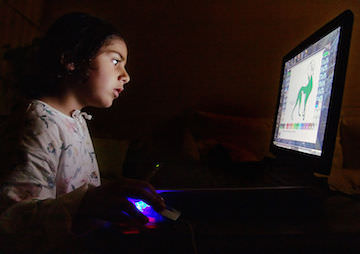How Too Much Electronic Screen Time Is Making Kids ‘Moody, Crazy and Lazy’
Excessive use of electronic devices by children can lead to serious physiological dysfunction, according to a child psychiatrist who argues for an "electronic fast." Wikimedia
Wikimedia
Excessive use of electronic devices by children can have alarming effects that may lead them to become “moody, crazy and lazy,” according to a child psychiatrist.
Writing in Psychology Today, Dr. Victoria L. Dunckley argues for an “electronic fast” and offers a look at six physiological mechanisms to explain electronics’ tendency to produce mood disturbance:
1. Screen-time disrupts sleep and desynchronizes the body clock. Because light from screen devices mimics daytime, it suppresses melatonin, a sleep signal released by darkness. Just minutes of screen stimulation can delay melatonin release by several hours and desynchronize the body clock. Once the body clock is disrupted, all sorts of other unhealthy reactions occur, such as hormone imbalance and brain inflammation. Plus, high arousal doesn’t permit deep sleep, and deep sleep is how we heal.
2. Screen-time desensitizes the brain’s reward system. Many children are “hooked” on electronics, and in fact gaming releases so much dopamine — the “feel-good” chemical — that on a brain scan it looks the same as cocaine use! When reward pathways are overused, they become less sensitive, and more and more stimulation is needed to experience pleasure. Meanwhile dopamine is also critical for focus and motivation. Needless to say, even small changes in dopamine sensitivity can wreak havoc on how well a child feels and functions.
3. Screen-time produces “light-at-night.” Light-at-night from electronics has been linked to depression and even suicide risk in numerous studies. In fact, animal studies show that exposure to screen-based light before or during sleep causes depression even when the animal isn’t looking at the screen. Sometimes parents feel scared to restrict electronics use in a child’s bedroom because they worry the child will enter a state of total despair — but in fact removing light-at-night is protective.
4. Screen-time induces stress reactions. Both acute stress (fight-or-flight) and chronic stress produce changes in brain chemistry and hormones that can increase irritability. Indeed, cortisol, the chronic stress hormone, seems to be both a cause and effect of depression – creating a vicious cycle. Additionally, both hyperarousal and addiction pathways suppress the brain’s frontal lobe, the area where mood regulation actually takes place.
5. Screen-time overloads the sensory system, fractures attention, and depletes mental reserves. Experts say that what’s often behind explosive and aggressive behavior is poor focus. When attention suffers, so does the ability to process one’s internal and external environment, so little demands become big ones. By depleting mental energy with high visual and cognitive input, screen-time contributes to low reserves. One way to temporarily “boost” depleted reserves is to become angry, so meltdowns become a coping mechanism.
6. Screen-time reduces physical activity levels and exposure to “green-time.” Research shows these factors restore attention, lower stress, and reduce aggression. Thus, time spent with electronics reduces exposure to natural mood enhancers.
Read the full article here.
–Posted by Roisin Davis
Your support matters…Independent journalism is under threat and overshadowed by heavily funded mainstream media.
You can help level the playing field. Become a member.
Your tax-deductible contribution keeps us digging beneath the headlines to give you thought-provoking, investigative reporting and analysis that unearths what's really happening- without compromise.
Give today to support our courageous, independent journalists.






You need to be a supporter to comment.
There are currently no responses to this article.
Be the first to respond.